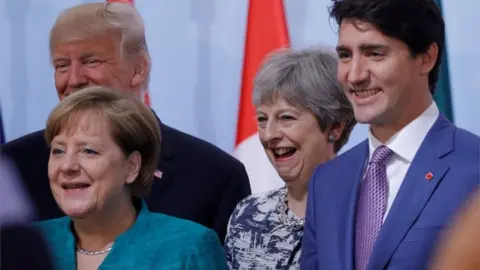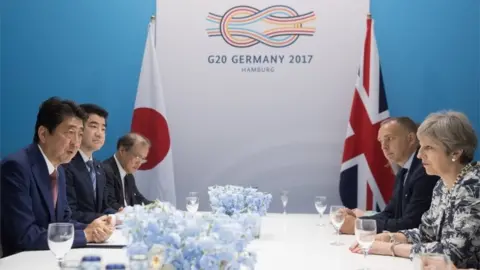G20: UK-US trade deal to happen quickly, says Trump
US President Donald Trump has said he expects a "powerful" trade deal with the UK to be completed "very quickly".
Speaking at the G20 summit in Hamburg, he said he would visit London. Asked when, he said: "We'll work that out."
In one-to-one talks, Mr Trump and UK Prime Minister Theresa May agreed to prioritise work on a post-Brexit trade deal, a UK government official said.
Mrs May said she was "optimistic" about a deal, but warned there was "a limit" to what could be done before Brexit.
She told a news conference that world leaders - including those from China, India and Japan, as well as the US - had expressed a "strong desire" to forge "ambitious new bilateral trading relationships" with Britain.
The prime minister hailed it as a "powerful vote of confidence" in Britain.
Asked about Mr Trump's visit the UK, Mrs May said: "We don't have a date yet, we are still working on a date."
Earlier, during a 50-minute meeting with Mr Trump - which overran by 20 minutes - the two leaders spent a "significant" amount of time on trade, in a discussion described as entirely "positive", Downing Street said.
Before their meeting, Mr Trump hailed the "very special relationship" he had developed with Mrs May.
"There is no country that could possibly be closer than our countries," he told reporters.
"We have been working on a trade deal which will be a very, very big deal, a very powerful deal, great for both countries and I think we will have that done very, very quickly."
Under EU rules, formal talks between London and Washington cannot begin until after the UK leaves the EU in March 2019, without EU agreement.
Sir Christopher Meyer, a former British ambassador to Washington, said Mr Trump's statement of intent was a "very good sign for the future" and would be "useful" to Mrs May.
However, Sir Simon Fraser, a former diplomat who served as a permanent under-secretary at the Foreign Office, cast doubt on how soon any trade deal could be reached.
 Reuters
Reuters"The point is we can't negotiate with them or anyone else until we've left the European Union," he said.
"And the Americans and others will not negotiate with us until they know what our relationship with the EU is going to be, because the access we have in Europe is hugely important for the advantages that they can get from their relations with us."
Mr Trump has previously accepted an invitation for a state visit to the UK - a prospect that has caused controversy - although no date has been given.
Mr Meyer said his visit would be a "very important moment" to nail down Mr Trump's commitment to a strong bilateral agreement.

Analysis: Is a quick deal possible?
 Getty Images
Getty ImagesBy Rob Young, BBC business correspondent
Under EU rules, formal talks between London and Washington cannot begin until March 2019, unless Brussels agrees the UK can make a start earlier.
Trade talks tend to be complex and technical, lasting several years.
The EU and Japan took four years to reach an agreement in principle. But those discussions involved 29 nations; UK-US talks would involve just two.
With strong political will and determination, a transatlantic agreement could perhaps be completed more speedily than has been the norm for trade pacts.
Talks would cover cutting customs duties, making products such as cars and food cheaper.
The average UK-US tariff is relatively low anyway, at 3%, and huge amounts of trade already take place.
Negotiations usually cover thornier topics, such as food safety and environmental standards.
If one side agreed to accept the other's rules, a deal could be done quickly. But that would be controversial in various sectors. That's when negotiations can begin to drag.

Mrs May later said she was "dismayed" Mr Trump had withdrawn the US from the Paris Agreement on climate change.
The accord, signed in Paris in 2015, is an international agreement on how to deal with greenhouse gas emissions.
Mrs May said she raised the issue during one of "a number" of conversations she had with Mr Trump at the summit - not during the official bilateral talks.
The prime minister said she had "urged President Trump to rejoin", adding: "I continue to hope that is exactly what the United States will do."
Mrs May also held a 20-minute meeting with Japanese Prime Minister Shinzo Abe and a 25-minute meeting with Indian prime minister Narendra Modi.
Talks with Mr Abe focused on trade and North Korea's nuclear missile programme.
Japan's new trade deal with the EU, signed off on Thursday, "could form the basis" of an agreement between London and Tokyo following Brexit, Mrs May told her fellow leader.
Meanwhile, Mr Modi told Mrs May he wanted to see economic links with the UK deepen now and after Brexit, according to a UK government official.
 PA
PAAfter a meeting on Friday, Chinese President Xi Jinping said China and the UK were in a "golden era" of relations and increased investment from his country since the Brexit vote showed its confidence in Britain.
The G20 summit is the first gathering of world leaders since the UK's general election last month, during which Mrs May's Conservative party lost seats and her performance was widely criticised.
The two-day meeting is being held against a backdrop of violent protests on the streets of Hamburg, with demonstrators and heavily-armed police clashing into the early hours of Saturday.
The protests centre mainly on the presence of Mr Trump and Russian President Vladimir Putin, climate change and global wealth inequalities.
